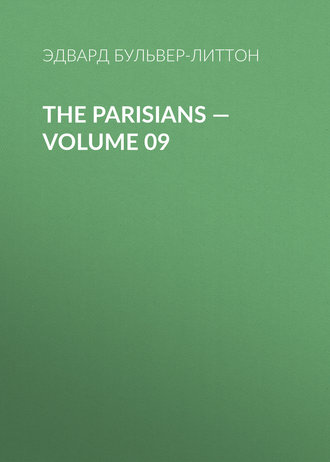
Эдвард Бульвер-Литтон
The Parisians — Volume 09
CHAPTER VI
On leaving his cousin's house Graham walked on, he scarce knew or cared whither, the image of the beloved dead so forcibly recalled the solemnity of the mission with which he had been intrusted, and which hitherto he had failed to fulfil. What if the only mode by which he could, without causing questions and suspicions that might result in dragging to day the terrible nature of the trust he held, enrich the daughter of Richard King, repair all wrong hitherto done to her, and guard the sanctity of Lady Janet's home,—should be in that union which Richard King had commended to him while his heart was yet free? In such a case, would not gratitude to the dead, duty to the living, make that union imperative at whatever sacrifice of happiness to himself? The two years to which Richard King had limited the suspense of research were not yet expired. Then, too, that letter of Lady Janet's,—so tenderly anxious for his future, so clear-sighted as to the elements of his own character in its strength or its infirmities—combined with graver causes to withhold his heart from its yearning impulse, and—no, not steel it against Isaura, but forbid it to realise, in the fair creature and creator of romance, his ideal of the woman to whom an earnest, sagacious, aspiring man commits all the destinies involved in the serene dignity of his hearth. He could not but own that this gifted author—this eager seeker after fame—this brilliant and bold competitor with men on their own stormy battle-ground-was the very person from whom Lady Janet would have warned away his choice. She (Isaura) merge her own distinctions in a husband's;—she leave exclusively to him the burden of fame and calumny! —she shun "to be talked about!" she who could feel her life to be a success or a failure, according to the extent and the loudness of the talk which it courted!
While these thoughts racked his mind, a kindly hand was laid on his arm, and a cheery voice accosted him. "Well met, my dear Vane! I see we are bound to the same place; there will be a good gathering to-night."
"What do you mean, Bevil? I am going nowhere, except to my own quiet rooms."
"Pooh! Come in here at least for a few minutes,"—and Bevil drew him up to the door-step of a house close by, where, on certain evenings, a well- known club drew together men who seldom meet so familiarly elsewhere—men of all callings; a club especially favoured by wits, authors, and the flaneurs of polite society.
Graham shook his head, about to refuse, when Bevil added, "I have just come from Paris, and can give you the last news, literary, political, and social. By the way, I saw Savarin the other night at the Cicogna's—he introduced me there." Graham winced; he was spelled by the music of a name, and followed his acquaintance into the crowded room, and, after returning many greetings and nods, withdrew into a remote corner, and motioned Bevil to a seat beside him.
"So you met Savarin? Where, did you say?"
"At the house of the new lady-author—I hate the word authoress— Mademoiselle Cicogna! Of course you have read her book?"
"Yes."
"Full of fine things, is it not?—though somewhat highflown and sentimental: however, nothing succeeds like success. No book has been more talked about at Paris: the only thing more talked about is the lady- author herself."
"Indeed, and how?"
"She doesn't look twenty, a mere girl—of that kind of beauty which so arrests the eye that you pass by other faces to gaze on it, and the dullest stranger would ask, 'Who, and what is she?' A girl, I say, like that—who lives as independently as if she were a middle-aged widow, receives every week (she has her Thursdays), with no other chaperon than an old ci-devant Italian singing woman, dressed like a guy—must set Parisian tongues into play even if she had not written the crack book of the season."
"Mademoiselle Cicogna receives on Thursdays,—no harm in that; and if she have no other chaperon than the Italian lady you mention, it is because Mademoiselle Cicogna is an orphan, and having a fortune, such as it is, of her own, I do not see why she should not live as independently as many an unmarried woman in London placed under similar circumstances. I suppose she receives chiefly persons in the literary or artistic world, and if they are all as respectable as the Savarins, I do not think ill- nature itself could find fault with her social circle."
"Ah! you know the Cicogna, I presume. I am sure I did not wish to say anything that could offend her best friends, only I do think it is a pity she is not married, poor girl!"
"Mademoiselle Cicogna, accomplished, beautiful, of good birth (the Cicogna's rank among the oldest of Lombard families), is not likely to want offers."
"Offers of marriage,—h'm—well, I dare say, from authors and artists. You know Paris better even than I do, but I don't suppose authors and artists there make the most desirable husbands; and I scarcely know a marriage in France between a man-author and lady-author which does not end in the deadliest of all animosities—that of wounded amour propre. Perhaps the man admires his own genius too much to do proper homage to his wife's."
"But the choice of Mademoiselle Cicogna need not be restricted to the pale of authorship—doubtless she has many admirers beyond that quarrelsome borderland."
"Certainly-countless adorers. Enguerrand de Vandemar—you know that diamond of dandies?"
"Perfectly—is he an admirer?"
"Cela va sans dire—he told me that though she was not the handsomest woman in Paris, all other women looked less handsome since he had seen her. But, of course, French lady-killers like Enguerrand, when it comes to marriage, leave it to their parents to choose their wives and arrange the terms of the contract. Talking of lady-killers, I beheld amid the throng at Mademoiselle Cicogna's the ci-devant Lovelace whom I remember some twenty-three years ago as the darling of wives and the terror of husbands-Victor de Mauleon."
"Victor de Mauleon at Mademoiselle Cicogna's!—what, is that man restored to society?"
"Ah! you are thinking of the ugly old story about the jewels—oh, yes, he has got over that; all his grand relations, the Vandemars, Beauvilliers, Rochebriant, and others, took him by the hand when he reappeared at Paris last year; and though I believe he is still avoided by many, he is courted by still more—and avoided, I fancy, rather from political than social causes. The Imperialist set, of course, execrate and prescribe him. You know he is the writer of those biting articles signed Pierre Firmin in the Sens Commun; and I am told he is the proprietor of that very clever journal, which has become a power."
"So, so—that is the journal in which Mademoiselle Cicogna's roman first appeared. So, so—Victor de Mauleon one of her associates, her counsellor and friend—ah!"
"No, I didn't say that; on the contrary, he was presented to her the first time the evening I was at the house. I saw that young silk-haired coxcomb, Gustave Rameau, introduce him to her. You don't perhaps know Rameau, editor of the Sens Commun—writes poems and criticisms. They say he is a Red Republican, but De Mauleon keeps truculent French politics subdued if not suppressed in his cynical journal. Somebody told me that the Cicogna is very much in love with Rameau; certainly he has a handsome face of his own, and that is the reason why she was so rude to the Russian Prince X——-."
"How rude! Did the Prince propose to her?"
"Propose! you forget—he is married. Don't you know the Princess? Still there are other kinds of proposals than those of marriage which a rich Russian prince may venture to make to a pretty novelist brought up for the stage."
"Bevil!" cried Graham, grasping the man's arm fiercely, "how dare you?"
"My dear boy," said Bevil, very much astonished, "I really did not know that your interest in the young lady was so great. If I have wounded you in relating a mere on dit picked up at the Jockey Club, I beg you a thousand pardons. I dare say there was not a word of truth in it."
"Not a word of truth, you may be sure, if the on dit was injurious to Mademoiselle Cicogna. It is true, I have a strong interest in her; any man—any gentleman—would have such interest in a girl so brilliant and seemingly so friendless. It shames one of human nature to think that the reward which the world makes to those who elevate its platitudes, brighten its dulness, delight its leisure, is Slander! I have had the honour to make the acquaintance of this lady before she became a 'celebrity,' and I have never met in my paths through life a purer heart or a nobler nature. What is the wretched on dit you condescend to circulate? Permit me to add:
"'He who repeats a slander shares the crime.'"
"Upon my honour, my dear Vane," said Bevil seriously (he did not want for spirit), "I hardly know you this evening. It is not because duelling is out of fashion that a man should allow himself to speak in a tone that gives offence to another who intended none; and if duelling is out of fashion in England, it is still possible in France.—Entre nous, I would rather cross the Channel with you than submit to language that conveys unmerited insult."
Graham's cheek, before ashen pale, flushed into dark red. "I understand you," he said quietly, "and will be at Boulogne to-morrow."
"Graham Vane," replied Bevil, with much dignity, "you and I have known each other a great many years, and neither of us has cause to question the courage of the other; but I am much older than yourself—permit me to take the melancholy advantage of seniority. A duel between us in consequence of careless words said about a lady in no way connected with either, would be a cruel injury to her; a duel on grounds so slight would little injure me—a man about town, who would not sit an hour in the House of Commons if you paid him a thousand pounds a minute. But you, Graham Vane—you whose destiny it is to canvass electors and make laws— would it not be an injury to you to be questioned at the hustings why you broke the law, and why you sought another man's life? Come, come! shake hands and consider all that seconds, if we chose them, would exact, is said, every affront on either side retracted, every apology on either side made."
"Bevil, you disarm and conquer me. I spoke like a hotheaded fool; forget it—forgive. But—but—I can listen calmly now—what is that on dit?"
"One that thoroughly bears out your own very manly upholding of the poor young orphan, whose name I shall never again mention without such respect as would satisfy her most sensitive champion. It was said that the Prince X——— boasted that before a week was out Mademoiselle Cicogna should appear in his carriage at the Bois de Boulogne, and wear at the opera diamonds he had sent to her; that this boast was enforced by a wager, and the terms of the wager compelled the Prince to confess the means he had taken to succeed, and produce the evidence that he had lost or won. According to this on dit, the Prince had written to Mademoiselle Cicogna, and the letter had been accompanied by a parure that cost him half a million of francs; that the diamonds had been sent back with a few words of such scorn as a queen might address to an upstart lackey. But, my dear Vane, it is a mournful position for the girl to receive such offers; and you must agree with me in wishing she were safely married, even to Monsieur Rameau, coxcomb though he be. Let us hope that they will be an exception to French authors, male and female, in general, and live like turtle-doves."
CHAPTER VII
A few days after the date of the last chapter, Colonel Morley returned to Paris. He had dined with Graham at Greenwich, had met him afterwards in society, and paid him a farewell visit on the day before the Colonel's departure; but the name of Isaura Cicogna had not again been uttered by either. Morley was surprised that his wife did not question him minutely as to the mode in which he had executed her delicate commission, and the manner as well as words with which Graham had replied to his "ventilations." But his Lizzy cut him short when he began his recital:
"I don't want to hear anything more about the man. He has thrown away a prize richer than his ambition will ever gain, even if it gained him a throne."
"That it can't gain him in the old country. The people are loyal to the present dynasty, whatever you may be told to the contrary."
"Don't be so horribly literal, Frank; that subject is done with. How was the Duchess of ——— dressed?"
But when the Colonel had retired to what the French call the cabinet de traivail—and which he more accurately termed his "smoke den"—and there indulged in the cigar which, despite his American citizenship, was forbidden in the drawing-room of the tyrant who ruled his life, Mrs. Morley took from her desk a letter received three days before, and brooded over it intently, studying every word. When she had thus reperused it, her tears fell upon the page. "Poor Isaura!" she muttered —"poor Isaura! I know she loves him—and how deeply a nature like hers can love! But I must break it to her. If I did not, she would remain nursing a vain dream, and refuse every chance of real happiness for the sake of nursing it." Then she mechanically folded up the letter—I need not say it was from Graham Vane—restored it to the desk, and remained musing till the Colonel looked in at the door and said peremptorily, "Very late—come to bed."
The next day Madame Savarin called on Isaura.
"Chere enfant," said she, "I have bad news for you. Poor Gustave is very ill—an attack of the lungs and fever; you know how delicate he is."
"I am sincerely grieved," said Isaura, in earnest tender tones; "it must be a very sudden attack: he was here last Thursday."
"The malady only declared itself yesterday morning, but surely you must have observed how ill he has been looking for several days past? It pained me to see him."
"I did not notice any change in him," said Isaura, somewhat conscience- stricken. Wrapt in her own happy thoughts, she would not have noticed change in faces yet more familiar to her than that of her young admirer.
"Isaura," said Madame Savarin, "I suspect there are moral causes for our friend's failing health. Why should I disguise my meaning? You know well how madly he is in love with you, and have you denied him hope?"
"I like M. Rameau as a friend; I admire him—at times I pity him."
"Pity is akin to love."
"I doubt the truth of that saying, at all events as you apply it now. I could not love M. Rameau; I never gave him cause to think I could."
"I wish for both your sakes that you could make me a different answer; for his sake, because, knowing his faults and failings, I am persuaded that they would vanish in a companionship so pure, so elevating as yours: you could make him not only so much happier but so much better a man. Hush! let me go on, let me come to yourself,—I say for your sake I wish it. Your pursuits, your ambition, are akin to his; you should not marry one who could not sympathise with you in these. If you did, he might either restrict the exercise of your genius or be chafed at its display. The only authoress I ever knew whose married lot was serenely happy to the last, was the greatest of English poetesses married to a great English poet. You cannot, you ought not, to devote yourself to the splendid career to which your genius irresistibly impels you, without that counsel, that support, that protection, which a husband alone can give. My dear child, as the wife myself of a man of letters, and familiarised to all the gossip, all the scandal, to which they who give their names to the public are exposed, I declare that if I had a daughter who inherited Savarin's talents, and was ambitious of attaining to his renown, I would rather shut her up in a convent than let her publish a book that was in every one's hands until she had sheltered her name under that of a husband; and if I say this of my child, with a father so wise in the world's ways, and so popularly respected as my bon homme, what must I feel to be essential to your safety, poor stranger in our land! poor solitary orphan! with no other advice or guardian than the singing mistress whom you touchingly call 'Madre!' I see how I distress and pain you—I cannot help it. Listen! The other evening Savarin came back from his favourite cafe in a state of excitement that made me think he came to announce a revolution. It was about you; he stormed, he wept— actually wept—my philosophical laughing Savarin. He had just heard of that atrocious wager made by a Russian barbarian. Every one praised you for the contempt with which you had treated the savage's insolence. But that you should have been submitted to such an insult without one male friend who had the right to resent and chastise it,—you cannot think how Savarin was chafed and galled. You know how he admires, but you cannot guess how he reveres you; and since then he says to me every day: 'That girl must not remain single. Better marry any man who has a heart to defend a wife's honour and the nerve to fire a pistol: every Frenchman has those qualifications!'"
Here Isaura could no longer restrain her emotions; she burst into sobs so vehement, so convulsive, that Madame Savarin became alarmed; but when she attempted to embrace and soothe her, Isaura recoiled with a visible shudder, and gasping out, "Cruel, cruel!" turned to the door, and rushed to her own room.
A few minutes afterwards a maid entered the salon with a message to Madame Savarin that Mademoiselle was so unwell that she must beg Madame to excuse her return to the salon.
Later in the day Mrs. Morley called, but Isaura would not see her.
Meanwhile poor Rameau was stretched on his sick-bed, and in sharp struggle between life and death. It is difficult to disentangle, one by one, all the threads in a nature so complex as Rameau's; but if we may hazard a conjecture, the grief of disappointed love was not the immediate cause of his illness, and yet it had much to do with it. The goad of Isaura's refusal had driven him into seeking distraction in excesses which a stronger frame could not have courted with impunity. The man was thoroughly Parisian in many things, but especially in impatience of any trouble. Did love trouble him—love could be drowned in absinthe; and too much absinthe may be a more immediate cause of congested lungs than the love which the absinthe had lulled to sleep.
His bedside was not watched by hirelings. When first taken thus ill—too ill to attend to his editorial duties—information was conveyed to the publisher of the Sens Commun, and in consequence of that information, Victor de Mauleon came to see the sick man. By his bed he found Savarin, who had called, as it were by chance, and seen the doctor, who had said, "It is grave. He must be well nursed." Savarin whispered to De Mauleon, "Shall we call in a professional nurse, or a soeur de charite?"
De Mauleon replied, also in a whisper, "Somebody told me that the man had a mother."
It was true—Savarin had forgotten it. Rameau never mentioned his parents—he was not proud of them.







